|
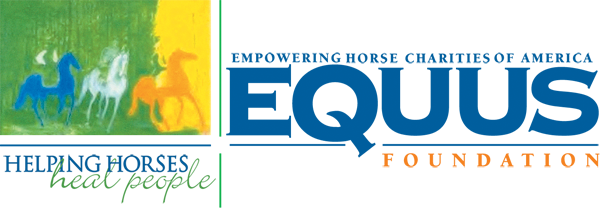
Margo Dewkett Named 2013 EQUUS Foundation/USEF Humanitarian Award Recipient
WESTPORT, CT - January 17, 2014 - Margo Dewkett was honored as the 2013 recipient of the EQUUS Foundation Humanitarian Award at the United States Equestrian Federation (USEF) Pegasus Awards Dinner on Friday, January 10, 2014, during the Federation's Annual Meeting in Lexington Kentucky.
The USEF/EQUUS Foundation Humanitarian Award is a celebration of the humanitarian achievements made by a member of the equestrian world. From improving the health and welfare of the horse to promoting and expanding the general public's appreciation and respect of the diverse roles of horses, the recipient of this award has devoted considerable personal time to making the lives and quality of life of our equine partners paramount.
In addition to the recognition of winning this prestigious award, the recipient receives a $5,000 grant from the EQUUS Foundation to be awarded to a horse-related charity of his or her choice. "It was no surprise," said Lynn Coakley, EQUUS Foundation President who presented the award with USEF CEO John Long, "that Margo selected Windridge Therapeutic Equestrian Center in Longview, Texas, to receive the grant."
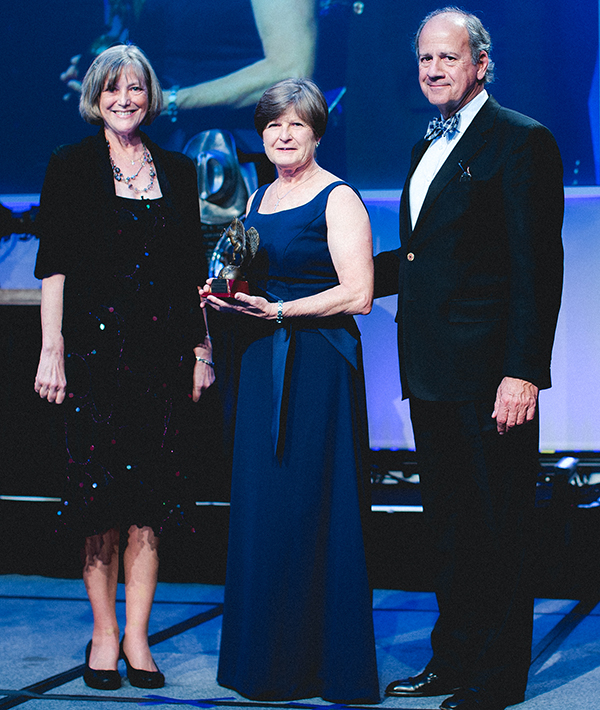
Left to Right: Lynn Coakley, Margo Dewkett and John Long. Photo courtesy of Adam Brennan/USEF.
|
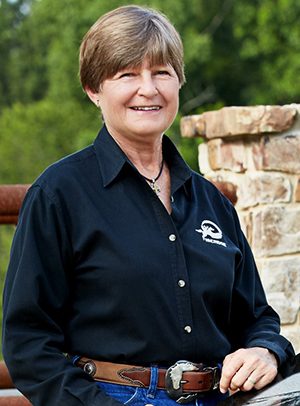
Margo Dewkett founded Windridge Therapeutic Equestrian Center in 1988 with the desire to share horses as a unique therapy tool to children, adults and veterans with disabilities. Using a small wooden frame barn that sat on fifteen acres, she started with five horses, five volunteers, herself as the instructor, and two clients. Classes began on March 6, 1989, making Windridge the first therapeutic riding center in East Texas to provide equine-assisted activities and therapies (EAAT).
The five original Windridge horses were retired race, jumping and endurance horses, trained by Margo for their new careers. Throughout the years, many horses have come to be a part of Windridge's EAAT programs. Several horses came backgrounds where they were not properly cared for. Margo graciously took them in and retrained them for a therapy career in an environment where they felt safe and secure.
During their time at Windridge, these specially trained horses were a part of children's first attempts at sitting up, first words, and for some children, their first steps. Twenty-four years later Windridge has grown to assist more than 120 clients weekly in a 10-county region, employ 6 PATH International certified instructors, 2 PATH International instructors-in-training, utilizing 21 horses, and more than 60 volunteers.
To date, while proven in practice, the horse has yet to be scientifically validated as a therapy tool and only a very few therapists are able to receive third party reimbursement for services rendered. Margo, supported by Windridge's board of directors, developed a research team and built a first-of-its-kind research room designed to scientifically validate the horse's movement as a therapy technique. Windridge's research room is equipped with an equine treadmill and motion capture system with specially designed software to collect and interpret data on human and equine subjects in real time.
Margo is co-authoring a textbook titled, The Comprehensive Guide to Equine-Assisted Activities and Therapies. The textbook will provide a common base of knowledge about the equine-assisted and therapy (EAAT) industry, the benefits the horse provides children and adults with disabilities and mental health needs. The textbook focuses on how to select, train and maintain the horses as well as the horse's role in EAAT programs, how to avoid common mistakes made with the horses, especially equine burnout.
"We are proud to recognize Margo as a leader in the EAAT industry who has worked tirelessly to secure its professional status through research and the academic world, said John Long, USEF CEO. "However, she has never lost sight of her primary focus - the children, adults, and veterans that participate in Windridge's programs."
Since 1988, Margo has provided every opportunity necessary for participants in her program to reach goals professionals thought impossible and for families to realize the abilities their loved ones are capable of - while at the same time making sure the horses - most of them abused or neglected - enjoy a permanent career and home for the remainder of their lives.
|
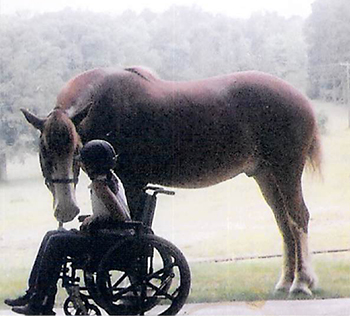
In her own words . . .
"I had the great fortune to be able to spend some personal time with Margo and her husband Bruce at the USEF Annual Meeting" said Coakley. "Margo said to me, 'If there were enough hours in the day I'd thank you by sharing with you the stories of how the lives of every child and adult at Windridge have been changed by horses, I would begin with this one.
This story is about Addie. One of the children who came to ride on a icy cold rainy Wednesday prior to Christmas week. You might ask, “Why”? and I would answer, because their parents know the significant benefits their child receives when they ride their horse.
Of course, our moms have learned how to dress their children warmly. We might put wool socks over their shoes to keep their toes warm. In fact, sometimes wool socks are even the best mittens, especially for little hands that barely open. It grew colder by the hour. Even so, as long as the horse maintained a walk Addie's body stayed warm because her bodies was steadily working.
When Addie first started riding at Windridge, she was unable to sit independently. Over the past couple years, Addie gained the awareness, balance and muscle coordination to sit, stand and begin to walk assisted by her therapist. That day, she was able to kneel on her horse's back, and sit sideways and backwards. She clapped when her team praised her, looked to see if her mom and grandmother were watching her accomplishments and pouted when it was time to dismount her horse.
Addie's therapist dismounted her at the far end of the arena. Her challenge was to walk back to the therapy room assisted by the therapist along a concrete walkway specifically designed to to help Windridge riders to learn how to walk, learn how to maneuver their wheelchairs, walkers, or canes. When Addie first started riding with us, she was unable to sit independent.
That day - the Wednesday before Christmas - was the day that Addie walked independently for about 10 feet – for the very first time! It didn't matter how cold it was. Windridge's atmosphere was warm with the glow of a child taking steps no one thought she'd ever take.'"
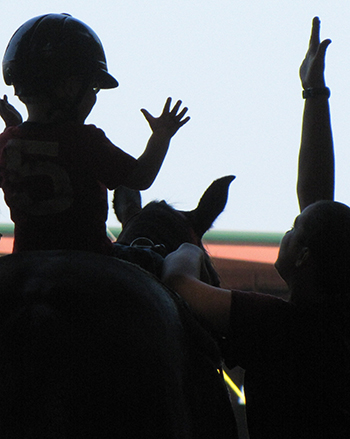
|
|
About EQUUS Foundation
The EQUUS Foundation, a 501(c)(3) public charity established in 2002, also known as Horse Charities of America, is the only national animal welfare charity and accrediting body in the United States that is 100% dedicated to equine welfare and with the dual mission to protect America's horses from peril and strengthen the bond between people and horses. Donations are tax-deductible to the full extent of the law. Contact the EQUUS Foundation, Inc., at 168 Long Lots Road, Westport, CT 06880, Tele: (203) 259-1550, E-Mail: mail@equusfoundation.org, Website: equusfoundation.org.
About The United States Equestrian Federation
Established in 1917, the United States Equestrian Federation (USEF), www.usef.org, is dedicated to uniting the equestrian community, honoring achievement, and serving as guardians of equestrian sport. The USEF promotes the safety and welfare of horses and riders while encouraging interest, participation and excellence at every competitive level and for all breed and discipline affiliates within the Federation family equally. The USEF is the only national organization dedicated to the promotion of the equestrian sport, fair competition and equine welfare regardless of breed or discipline.
|
|




